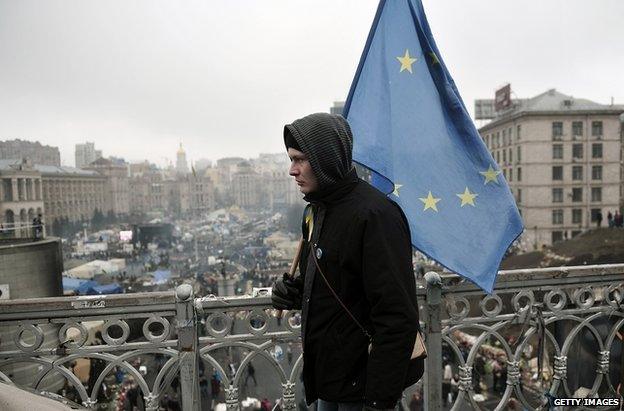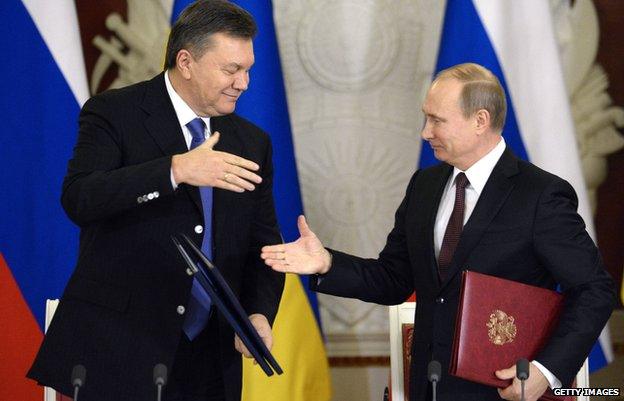Ukraine's sink or swim EU agreement
- Published

Viktor Yanukovych's rejection of the association agreement was a motivating force for pro-EU protesters
Ukraine's President Petro Poroshenko has signed a landmark free trade agreement with European leaders, slashing import tariffs with the European Union and committing the country to an ambitious programme of political and economic reform.
It is a momentous occasion for Ukrainians, marking not just a major step towards European integration, but also a culmination of the country's recent political upheavals.
Hundreds of thousands of Ukrainians took to the streets in November to protest against then President Viktor Yanukovych's abrupt decision to cancel the agreement's original planned signing.

After rejecting the EU deal in November, Mr Yanukovych signed an energy deal in Russia the next month
Although he claimed the treaty was merely being postponed, his actions were widely seen as something more permanent - a rejection of Europe and a move towards Russia.
The demonstrations grew in size and anger until they resulted in Mr Yanukovych fleeing the country in February. A pro-EU government replaced him.
Kremlin fears
Only seven months have passed since the first protests, and Ukraine appears to be a different country. The deal Mr Yanukovych rejected has been signed by his successor.
But some things haven't changed. Russia remains unwavering in its opposition to the agreement.
The Kremlin maintains that once the treaty comes into effect, European exports could find their way into Russia duty-free, since Kiev has its own beneficial trade conditions with Moscow. Or less expensive European goods could force Ukrainian goods out of their own market and into Russia.
As a result, Russian officials say they could very likely raise tariffs on Ukrainian imports, and thereby restrict business between the two countries.
The threat has serious implications. Russia is Ukraine's single largest export market, accounting for nearly a quarter of the country's international trade.
The Kremlin has already taken a number of steps that are widely viewed as attempts to punish Ukraine. Various items have been deemed unsafe and blocked from the Russian market: chocolate, cheese and potatoes, for example. The government in Moscow has also drastically raised the price Ukraine pays it for natural gas.
In addition, Russia's annexation of Ukraine's southern region of Crimea and the ongoing pro-Russia insurgency in Ukraine's east are both viewed widely by Ukraine and its allies as payback for the Kiev government's pro-Western stance.
Many observers ask: "What more can Russia do?"
The conflict in Ukraine's east has not erupted into full-scale war yet - but it could
There could be deeper, more biting economic measures against Ukraine
Sergei Glazyev, one of Russian President Vladimir Putin's top advisers, has said signing the EU agreement would be "economic suicide" for Ukraine
Ukraine also faces a number of dangers closer to home. The country's economy is in a brittle state. Growth has plummeted and the government owes billions of dollars to international investors.
Ukraine's President Petro Poroshenko is set to sign a landmark free trade agreement with European leaders.
In the long term, the EU agreement is supposed to bring a boost. The country's producers will have free access to the world's biggest free trade area.
EU rules and stipulations should also improve Ukraine's business climate as a whole. The country will be required to introduce wide-ranging reforms - increasing transparency, reducing corruption and raising the quality of its output.
But in the short term, this will cause a great deal of pain and disruption, as local businesspeople struggle to make the change. Complicating matters is the fact that many don't know what exactly they will need to do.
Sergiy Klymenko - who owns a local lingerie producer, Yanser - accepts Ukrainian businesses will initially suffer, and European businesses will enter the market and create stiff competition. But he believes "there's no alternative" to the path to Europe.
"It's a question of the movement and development of society," he said amidst stacks of multi-coloured women's underwear at his company's design studio in Kiev. "The freedoms that the EU represent are very important for our country."
"It's like diving into the water," he adds. "Whether you succeed or not depends on the ability of each individual athlete."
"Some people will swim," he says. "And some will drown."